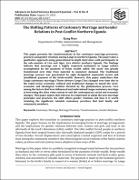The Shifting Patterns of Customary Marriage and Gender Relations in Post-Conflict Northern Uganda
Abstract
This paper presents the transformations in the customary marriage processes,
practices and gender relations among Lango in northern Uganda. The paper takes a
qualitative approach using generational in-depth interviews with participants in
the sub-counties of Lira and Ogur, Lira district northern Uganda. The findings
indicate that marriage was a highly respected institution in Lango culture
accomplished by the payment of bride wealth called ‘lim nyom’ but greatly
transformed over time from material to monetary demand. The traditional
marriage process was punctuated by eight designated sequential events and
installment payment of the bride-wealth. However, this paper underlines that
Lango customary marriage (‘Nyom tekwaro Lango’) has changed over time due to
the rapid social, economic, cultural and traditional changes to match the socioeconomic
and ideological realities dictated by the globalization process. Core
among the factors that have influenced and undermined Lango customary marriage
is borrowing the alien value system to suit the contemporary social and economic
changes. This paper argues that whereas it is important to adopt the new marriage
principles and practices, the shift affects gender relations and thus it is worth
retaining the significant valuable customary practices that knit family and
community members.
Collections
- Research Articles [139]

